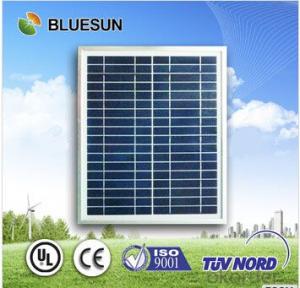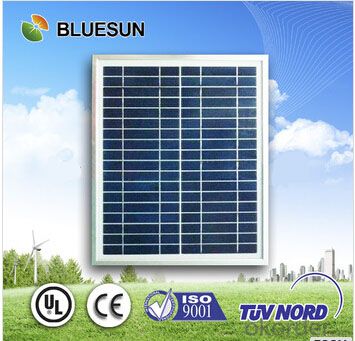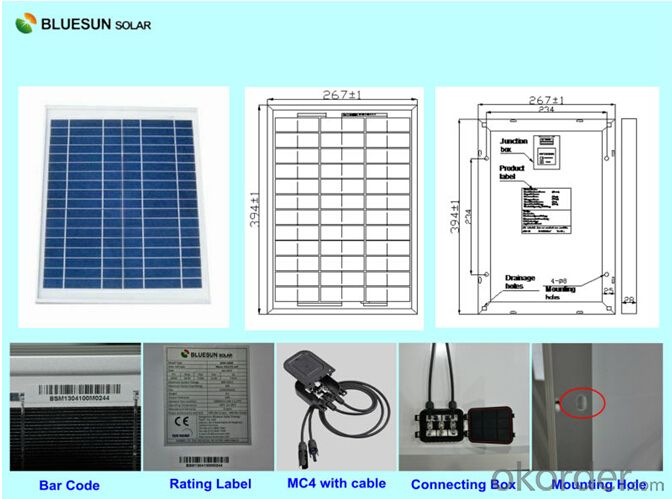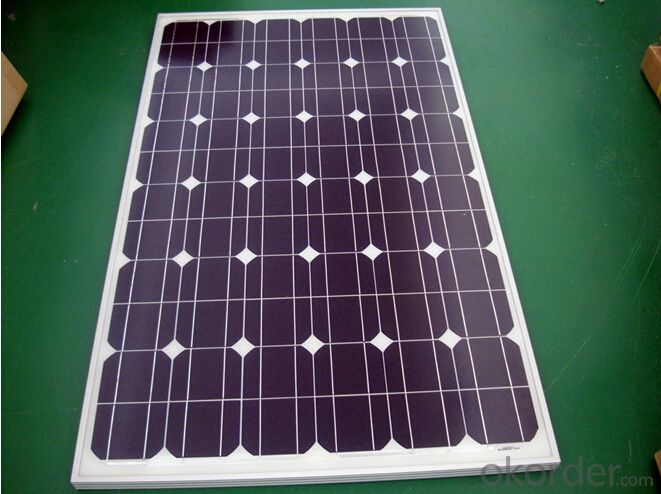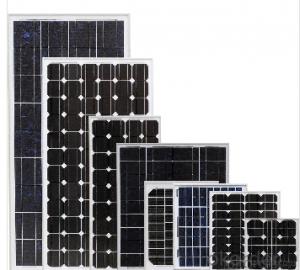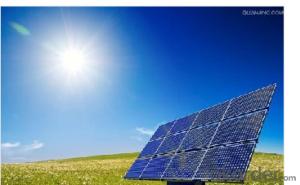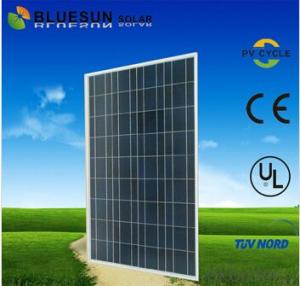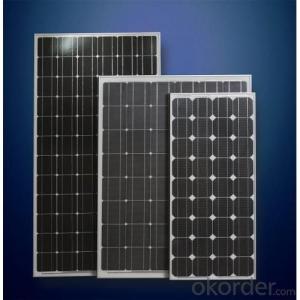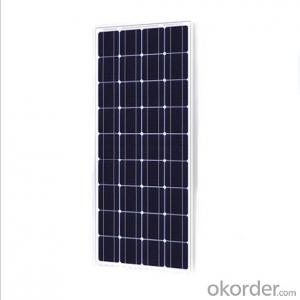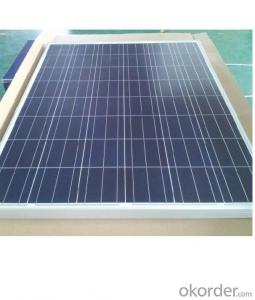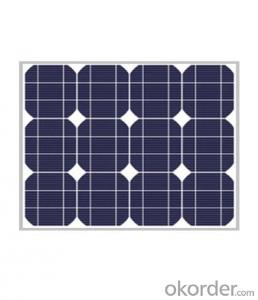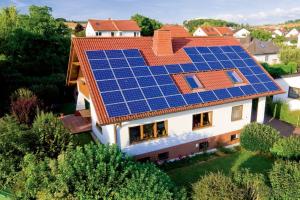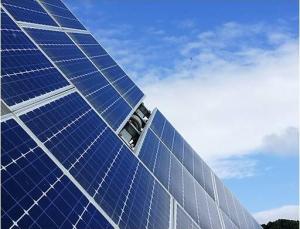Solar Panels Louisville Ky - Polycrystalline Silicon Solar Modules 20watt
- Loading Port:
- Shanghai
- Payment Terms:
- TT or LC
- Min Order Qty:
- 200 watt
- Supply Capability:
- 3000000 watt/month
OKorder Service Pledge
OKorder Financial Service
You Might Also Like
Polycrystalline Silicon Solar Modules 20WattPoly-Crystalline Module, Poly 156 cell, 36pcs.Power 20w panel.
1. Main Features of the Polycrystalline Silicon Solar Modules 20Watt Description
Warranties
1. 10 years limited product warranty
2. 15 years at 90% of the minimal rated power output
3. 25 years at 80% of the minimal rated power output
2. Polycrystalline Silicon Solar Modules 20Watt Specification
| poly156cell, 20w poly | |||||
| Maximum Power(W) | 20w | ||||
| Optimum Power Voltage(Vmp) | 17.2v | ||||
| Optimum Operatige Current(Imp) | 1.17A | ||||
| Open Circuit Voltage(Voc) | 21.8V | ||||
| Short Circuit Current(Isc) | 1.23A | ||||
| Solar Cell | 156*156mm Poly | ||||
| Number of Cell(pcs) | 36 (2*18) | ||||
| Brand Name of Solar Cells | JA Cell, Bluesun Cell | ||||
| Size of Module(mm) | 505mm*353mm*28mm | ||||
| Cable & Connector Type | Pass the TUV Certificate | ||||
| Frame(Material Corners,etc.) | Anodized aluminium-alloy | ||||
| Back sheet | TPT | ||||
| Cell Efficiency(%) | 13.8 | ||||
| Weight Per Piece(KG) | 2.25KG | ||||
| FF (%) | 70-76% | ||||
| Junction Box Type | IP65 PV junction box | ||||
| Tolerance Wattage(e.g.+/-5%) | 0~3% | ||||
| Front Glass Thikness(mm) | 3.2 | ||||
| Temperature Coefficients of Isc(%) | +0.035%/K | ||||
| Temperature Coefficients of Voc(%) | -0.351%/K | ||||
| Temperature Coefficients of Pm(%) | -0.47%/K | ||||
| Temperature Coefficients of Im(%) | 0.04 | ||||
| Temperature Coefficients of Vm(%) | -0.38 | ||||
| Temperature Range | -40°C to +85°C | ||||
| Surface Maximum Load Capacity | 2400Pa | ||||
| Allowable Hail Load | 23m/s ,7.53g | ||||
| Bypass Diode Rating(A) | 12 | ||||
| Warranty | 100% of 10 years, 80% of 25 years. | ||||
| Standard Test Conditions | AM1.5 1000W/m² 25 +/-2°C | ||||
| Packing | carton or pallet | ||||
3. Detail picture of Polycrystalline Silicon Solar Modules 20Watt
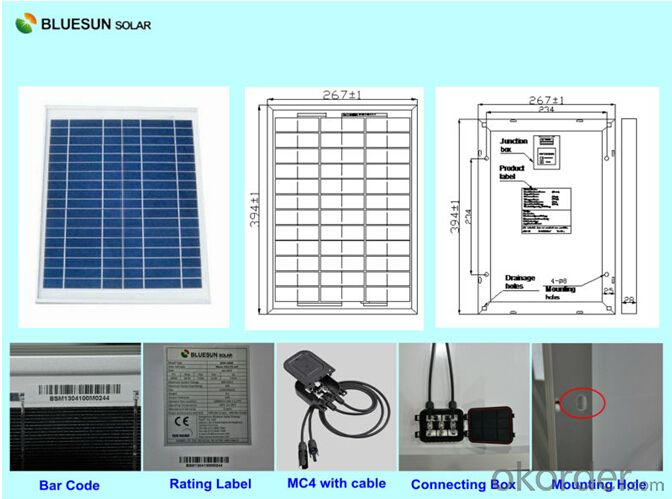
4. Certificate of Polycrystalline Silicon Solar Modules 20Watt
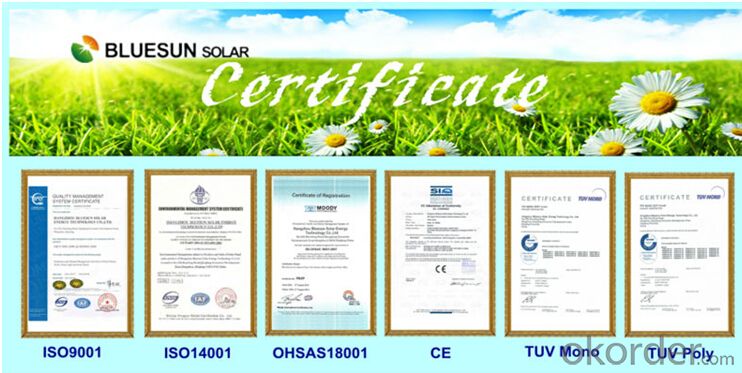
- Q: What is the warranty period for solar panels?
- The warranty period for solar panels can vary depending on the manufacturer, but it is typically between 10 to 25 years.
- Q: I need to power a series of meraki wireless repeaters that plug into a standerd wall outlet. consuming 5v or .08 amps However I need this in a remote location (like out in the middle of nowhere) Using A solar panel as power supply and a battery to store the energy but, how and what do I use to convert the energy coming from the solar panel to the battery and the batteries power supply to match the needs of the meraki wireless repeater? How do I make this as compact as possible? Do I need a ac/dc converter? or dc/ac converter? Any suggestions or solutions would be great !
- Search the web for some of the inexpensive solar Cell Phone Chargers. They can be hooked in series or parallel as needed to get you teh voltage and current needed. The 80mA is not too tough, thats not much current. Suggestion is to use a battery that is constantly trickle-charged by the solar panel. This will assure operation on a cloudy day or at night. Another strange source for solar panels and solar charge systems is, believe it or not, Harbor Freight Tools. they are on the web as well as have stores all over.
- Q: What are the benefits of using solar panels?
- There are several benefits to using solar panels. Firstly, solar energy is a renewable source of energy, meaning it will never run out. It also produces clean energy, which reduces greenhouse gas emissions and helps combat climate change. Solar panels can help homeowners and businesses save money on their electricity bills by generating their own energy. Additionally, solar panels require minimal maintenance and have a long lifespan, making them a cost-effective investment in the long run. Finally, using solar panels can also contribute to energy independence, as it reduces reliance on traditional fossil fuels and centralized power grids.
- Q: What is the efficiency of solar panels?
- The efficiency of solar panels refers to how effectively they convert sunlight into usable electricity. Generally, the efficiency of solar panels ranges from 15 to 20 percent, with some advanced models achieving efficiencies of up to 23 percent. However, it's important to note that the efficiency can vary depending on various factors such as the type of panel, its age, location, and environmental conditions.
- Q: Can solar panels be used for powering a farm or agricultural operation?
- Yes, solar panels can be used to power a farm or agricultural operation. Solar energy can be harnessed through photovoltaic (PV) panels and converted into electricity to meet the energy demands of various agricultural activities such as irrigation, lighting, and running machinery. Solar power offers a sustainable and renewable energy source, reducing reliance on fossil fuels and minimizing operational costs for farmers. Additionally, solar panels can be installed on unused land, rooftops, or even integrated into greenhouses, making them highly adaptable for agricultural settings.
- Q: i want to join multiple solar panels into a bank so i only need one length of wire, i am going to use diodes to stop them sending power back into the one before it. is this ok or do i need something else?
- Check out some of the videos on YouTube on this subject.
- Q: Can solar panels be installed on a hotel or hospitality establishment?
- Yes, solar panels can be installed on a hotel or hospitality establishment. In fact, many hotels and hospitality establishments are increasingly adopting solar energy to reduce their carbon footprint, lower energy costs, and showcase their commitment to sustainability. Solar panels can be installed on rooftops, parking lots, or even as shading structures, providing clean and renewable energy to power the establishment's operations.
- Q: How much energy can solar panels produce?
- The amount of energy that solar panels can produce varies depending on various factors such as the size and efficiency of the panels, the location, and weather conditions. However, on average, a typical residential solar panel system can generate around 10 to 12 kilowatt-hours (kWh) of electricity per square meter per day.
- Q: How do solar panels affect the property's carbon footprint?
- Solar panels can significantly reduce a property's carbon footprint as they harness clean and renewable energy from the sun. By generating electricity without emitting greenhouse gases, solar panels help to offset the carbon emissions that would otherwise be produced by using traditional fossil fuel-based energy sources. This reduction in carbon footprint contributes to a more sustainable and environmentally friendly property.
- Q: Can solar panels be installed on a warehouse or industrial facility?
- Yes, solar panels can be installed on a warehouse or industrial facility. In fact, these types of large commercial buildings often have spacious rooftops that are ideal for hosting solar panels. Installing solar panels on warehouses and industrial facilities can help reduce electricity costs, generate clean energy, and contribute to sustainability efforts.
Send your message to us
Solar Panels Louisville Ky - Polycrystalline Silicon Solar Modules 20watt
- Loading Port:
- Shanghai
- Payment Terms:
- TT or LC
- Min Order Qty:
- 200 watt
- Supply Capability:
- 3000000 watt/month
OKorder Service Pledge
OKorder Financial Service
Similar products
Hot products
Hot Searches
Related keywords
